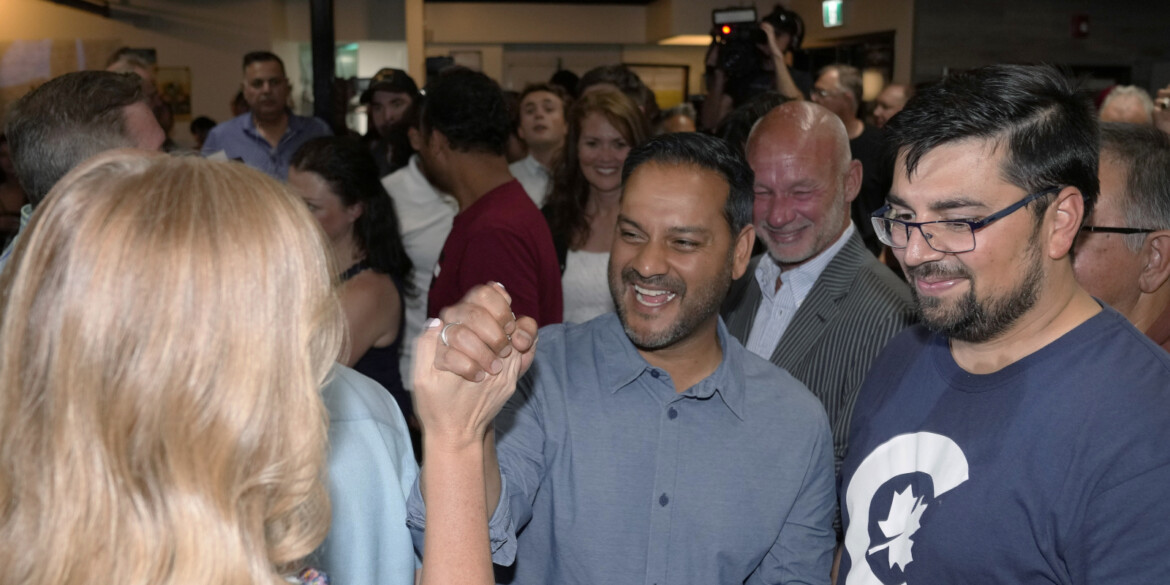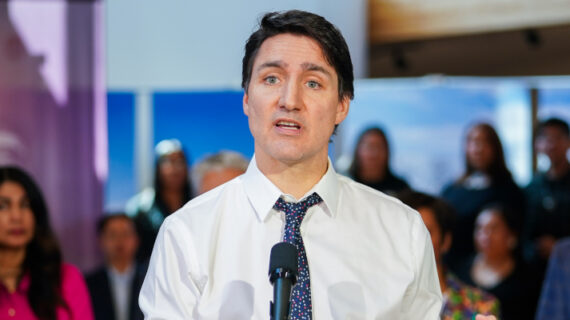- While their conservative cred comes before their identity, a pair of political newcomers in Jamil Jivani and Shuvaloy Majumdar are looking to represent a diverse new future for the Conservative Party.
- Jivani is looking to represent former CPC leader Erin O'Toole's riding in an upcoming byelection, while Majumdar recently won former prime minister Stephen Harper's seat in Calgary.
- While Majumdar and Jivani may be a sign of a younger, more diverse Conservative Party, they may also be living proof of an ongoing realignment among voters. Conservatives have increasingly been making inroads with blue-collar workers and with the unions that represent them.
Shuvaloy Majumdar and Jamil Jivani don’t mind being written about as the diverse future of the Conservative Party, except for a few caveats.
First, their conservative cred comes before their identity.
“I am Indian origin. But I also am a conservative and have been part of the conservative movement since my early 20s,” said Majumdar, in an interview with The Hub after winning a byelection in the Calgary Heritage riding.
“It’s interesting how people thrust their labels onto you and put their aspirations onto you. This is a party that celebrates merit and accomplishment,” said Majumdar.
Majumdar doesn’t buy the premise that the Conservative Party has a diversity problem, but some party insiders are concerned.
Dan Robertson, the chief strategist for the 2021 Conservative general election campaign and the founder of Pathos Strategy, said the exit polls coming out of the most recent election showed new Canadians and minorities were extremely suspicious of the Conservatives, even fearful.
“It’s not even that the Conservatives are just a party of a bunch of old rural White guys,” said Robertson. “It’s that they actually think we actively dislike them.”
Robertson said a better job of candidate recruitment could go a long way to reversing that trend.
Jivani, who is running for the Conservative nomination in Durham, a Greater Toronto Area riding, for an upcoming but yet to be called byelection, has always been comfortable writing and speaking about his identity, in part because he has been on the frontlines of the culture war as an author, radio host, and political commentator.
He still talks with an annoyed bewilderment about the time he made national headlines for a tweet arguing that it’s probably a bad idea to defund the police. When the CBC published a news story about his comments, it also embedded tweets exclusively of people harshly criticizing Jivani throughout the piece. The same week, the Globe and Mail published a story accusing Jivani, whose father is Black, of “anti-Blackness” for his tweets about the “gangster images” in hip hop music.
Jivani isn’t uncomfortable with the idea that he can be a role model, especially for young Canadians who might be worried about going against the ideological grain. It’s not uncommon for Jivani to see his opinions described as a “betrayal” by activists on the other side of the argument.
“I understand that diversity is important. I understand that, especially for representing people, which is what politics is supposed to be about. You want to have people of different walks of life, different life experiences as part of the political process, representing different points of view,” said Jivani, in an interview with The Hub.
“However, what I think is important is pushing back against tokenization,” said Jivani.
Representation and diversity are important, but it’s also important to have people running “who are accomplished and well-deserving of the opportunities they have earned,” he said.
Both men point to the grassroots foundation of the Conservative Party that demands open nominations and is suspicious of even mild favouritism from party brass in local nominations.
“This riding that I represent now was not gifted to me, I had to work for it. I had a contested nomination and I had a byelection,” said Majumdar.
“I wasn’t successful among conservatives in the nomination because of the fact that I come from an Indian-origin immigrant family. I was successful because I stand as a strong conservative,” he said.
It’s a strange quirk of fate that the ridings that used to belong to former prime minister Stephen Harper and former Conservative Party leader Erin O’Toole came up for byelections within a matter of months this year. With Majumdar already elected as an MP and Jivani vying for the chance to gain a seat in the House of Commons, the party leadership is literally stepping aside for the future of the party.
And that Majumdar and Jivani were contending for these seats at the same time is a coincidence, but no surprise. In different ways, they are both products of the conservative movement, with Jivani fresh from a stint running the Canada Strong and Free Network and Majumdar jumping into politics after leading the Macdonald-Laurier Institute’s foreign policy and national security program and previously working in Stephen Harper’s Conservative government.
On diversity, the Conservative Party may be a lagging indicator of the conservative movement, which is more diverse and energetic than ever before, said Robertson.
And it’s hard to understate the difficulty that the Conservative Party has been having with minority voters and new Canadians, said Robertson.
“We have taken on board real damage with minority voters. All the work that was done up to 2011 by the Harper government and the initiatives that Jason Kenney undertook, were basically set back to zero in the 2015 election and since,” said Robertson.
“Without dealing with this problem, there might be a path to winning government, but there’s not a path to winning a majority government,” he said.
Robertson said exit polling after the 2011 election showed that non-White voters were 39 percent less likely to vote for the Conservatives than White voters.
“That’s a big problem. That’s a super big problem,” said Robertson.

Jivani said his life experiences, such as growing up in a single-parent home will give him a different perspective on, for example, inflation and interest rate hikes.
“There are lots of different ways you can look at these issues. I come at it from a conservative point of view. But I also come at it from a point of view of someone who was raised in a single-parent household and has a Protestant mom and a Muslim dad and a White mom and a Black dad, and someone who grew up in the suburbs of Toronto. All those other things informed my point of view,” said Jivani.
While the Conservatives may be making progress on one side of the ledger, it’s notable that none of these new candidates are women. It is indicative of a larger trend in Canadian politics.
Recent polling shows a growing ideological divide between men and women, with men increasingly leaning towards the Conservatives and women shifting towards the two major progressive parties.
While recent polling has shown the Conservatives building a lead over the Liberals, sometimes by as much as 10 points, the party continues to poll much higher with men. A recent poll by Ipsos showed the party taking 41 percent of male voters compared to 30 percent of female voters.
Young voters in particular are highly polarized along gender lines. A March poll by the Angus Reid Institute showed the Conservatives appealing to 40 percent of men aged 18 to 34, while only 20 percent of women in that age group. Conversely, the NDP polled at 44 percent of young women and only 25 percent of young men.
Robertson believes this kind of gender polarization means the Conservatives have a narrow path to victory and will suffer in an election that doesn’t entirely revolve around the cost of living.
“The Liberals are extremely focused on female voters and are signalling to them non-stop,” said Robertson.
“I’m convinced that if the economy and pocketbook issues are the dominant vote-driving issues in the election the Conservatives are going to win. But if they’re not, anything could happen.”
The obvious strategy for the Liberals, Robertson believes, will be to spark a culture war and “diminish the salience of economic and pocketbook issues.”
In other words, get ready to start hearing about abortion around the time of the next election.

While Majumdar and Jivani may be a sign of a younger, more diverse Conservative Party, they may also be living proof of an ongoing realignment among voters.
Conservatives have increasingly been making inroads with blue-collar workers and with the unions that represent them, first with O’Toole’s campaign in 2021 and then, strikingly, in Doug Ford’s majority victory in Ontario, where he managed to poach blue-collar, industrial seats from the NDP.
While conservative intellectuals talk about an ideological realignment in theoretical terms, Jivani believes his life story is a real-world example of shifting voter blocs.
“So when we talk about realignment, I want to represent a working middle-class perspective on our society, on economics, on social issues, on cultural issues. I want to make sure that when we talk about these issues we’re accounting for how people are living life in the country,” said Jivani.
He doesn’t buy the premise that the Liberals own cultural issues, especially when it comes to blue-collar Canadians who may be tired of hearing about them. Both men see an opportunity in the Liberal devotion to identity politics and social justice ideas.
Majumdar said he wants to replace “social justice with social mobility.”
Jivani wants to challenge it.
“The reality is if you’re running around saying things like White privilege, you are basically saying the majority of the working and middle class and Canada is privileged,” said Jivani.
“That is not acceptable to talk about people in a way that dismisses the reality of life in this country.”




